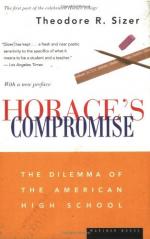|
This section contains 6,357 words (approx. 22 pages at 300 words per page) |

|
SOURCE: “The World of Nature: Time and Change” in The Odes of Horace: A Critical Study, Yale University Press, 1962, pp. 235-306.
In the following essay, Commager contends that Horace's nature poetry is not concerned with nature intrinsically, but with that aspect of nature from which one can draw moral lessons.
Nature as a Moral Metaphor
Discussions of Horace's treatment of nature have so tended toward the bucolic that the writer whom they present seems more nearly a farmer than a poet. His claim to be a ruris amator (Ep. 1.10.2) has been singled out for acrimonious debate, with the landscape of the second Epode providing the most common site for scholarly alarums and critical excursions. We are alternately invited to a kindred enthusiasm or to a tolerant skepticism as to the sincerity of his protestations. Sellar and Tyrrell, writing shortly before the turn of the century, assumed conflicting positions...
|
This section contains 6,357 words (approx. 22 pages at 300 words per page) |

|


